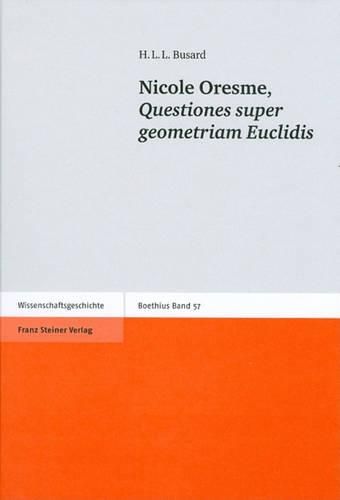Readings Newsletter
Become a Readings Member to make your shopping experience even easier.
Sign in or sign up for free!
You’re not far away from qualifying for FREE standard shipping within Australia
You’ve qualified for FREE standard shipping within Australia
The cart is loading…






Nicole Oresme (ca. 1320-1384) was one of the most important intellectual figures of the scholastic period: not only was he a leading philosopher, theologian, astronomer and mathematician, but he was also involved in practical matters - he was secretary to the king of France, he was bishop of Lisieux, and he was involved in the assessment of coins and associated political problems. He took part in the teaching of scholastic philosophy, writing numerous commentaries on Aristotle. His contributions to the so-called latitude of forms , i.e. the quantification of qualities, are universally recognized in modern scholarship. Also connected with university education are his Questiones on the Elements of Euclid, the basic and most widely read of the Greek mathematical classics. These Questiones cannot be regarded as a commentary, but rather examine problems suggested by Euclid’s text. Among the subjects investigated are the quantitative change of qualities, e.g. of velocity, colours or heat, in time. There are penetrating analyses of infinite and infinitesimal qualities.
$9.00 standard shipping within Australia
FREE standard shipping within Australia for orders over $100.00
Express & International shipping calculated at checkout
Nicole Oresme (ca. 1320-1384) was one of the most important intellectual figures of the scholastic period: not only was he a leading philosopher, theologian, astronomer and mathematician, but he was also involved in practical matters - he was secretary to the king of France, he was bishop of Lisieux, and he was involved in the assessment of coins and associated political problems. He took part in the teaching of scholastic philosophy, writing numerous commentaries on Aristotle. His contributions to the so-called latitude of forms , i.e. the quantification of qualities, are universally recognized in modern scholarship. Also connected with university education are his Questiones on the Elements of Euclid, the basic and most widely read of the Greek mathematical classics. These Questiones cannot be regarded as a commentary, but rather examine problems suggested by Euclid’s text. Among the subjects investigated are the quantitative change of qualities, e.g. of velocity, colours or heat, in time. There are penetrating analyses of infinite and infinitesimal qualities.